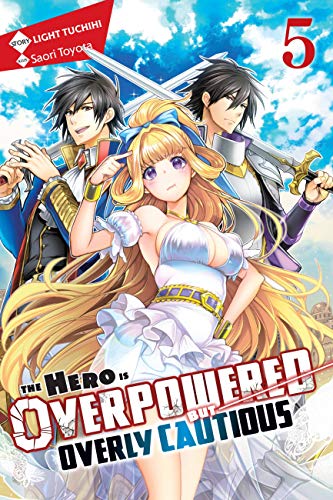By Light Tuchihi and Saori Toyota. Released in Japan as “Kono Yuusha Ga Ore TUEEE Kuse Ni Shinchou Sugiru” by Kadokawa Books. Released in North America by Yen On. Translated by Matt Rutsohn.
This is the end of an arc, and given the way the LAST arc ended, I think that fans of the series were going to be a little suspicious. The element of surprise is gone. Likewise, it’s hard to top “I was responsible for the end of the world and also my wife and unborn child were eaten in front of me before I died” for tragedy. That said, this is a relatively serious volume by Cautious Hero standards. There’s still a lot of the usual silly comedy we’ve come to expect, of course. Rista overreacts to things, helped along here by Jonde as tsukkomi #2. Seiya’s actions always seem, at first, to be completely ludicrous (at least until later in the book, when you see he was absolutely right to be crazy prepared). But the book actually has two depressing and tragic parts, one midway and one near the end, and both are handled pretty well. The author is learning to balance.
The cover shows off the first half of the book. Seiya, Rista, Jonde and Kiriko arrive at a desert wasteland that is the home of End Boss #4… only to find there’s a thriving village there, everyone knows who Seiya is, and he defeated the Demon Lord a year before. Its clearly a trap, and even Rista knows it’s a trap, but it’s hard not to find a happy, monster-free village likeable, especially when the OTHER Seiya shows up. You know, the reckless one. This version had ONE moment of caution when, after his wife begged him, they go see an oracle who pointed out the Demon Lord’s ability to resurrect himself. After this trap is sprung, Seiya and company go back to the God’s world to train. And train. And train. Why does Seiya seem to be avoiding the final battle? And why is he telling Rista to play with literal toys?
I will try not to get too into spoil territory here, but both tragedies that I mentioned before are pulled off very well, especially the second, which leaves Rista once again devastated and also explains how Seiya’s seemingly annoying and callous actions were once again him trying to be thoughtful and nice without actually being so. It’s notable that this volume has the least amount of abuse towards Rista of the five, though I’m not sure if Seiya is laying off or if it’s just due to the book’s more serious tone. There’s also a suggestion of where things are going to go from here, and it’s not a pretty one, as we’re led to question everything about the current world that the deities have for themselves. Are we headed for Cautious Hero: Civil War? And is the relationship between Seiya and Rista going to go anywhere?
I suspect the answer to the last is “no”, at least not till the final book. But as for next time, we’re starting a new plot, so I expect a lot more wacky gags. Till then, enjoy a series that manages to pull off “why am I crying about a slapstick comedy character – AGAIN?”.


Speak Your Mind